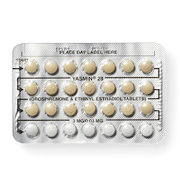Opill is a new progestin-only birth control pill (also called the mini-pill), that is available over the counter. That means you don’t need a prescription to get it. Opill is now available on Amazon,
Opill’s website, and some drugstores, convenience stores, and grocery stores.
You can start taking Opill at any time in your cycle. You may or may not need to use a backup form of birth control, like
condoms, when you switch to Opill––it depends on what kind of birth control you’ve been using (if any) and how consistently you’ve been using it.
If you are switching to Opill from a non-hormonal method of birth control, if you’re on a hormonal method but haven’t been using it consistently (you’ve missed pills or forgotten to change your ring or patch), or if you haven’t been using any type of birth control, you will need to use a backup method of birth control for 48 hours after starting Opill.
If you have been consistently using another method of hormonal birth control, including other brands of birth control pills, and you want to switch to Opill, you can start taking Opill the day you get it and stop using your old method right then, and you’ll be protected from pregnancy. You don’t need to use a backup method of birth control after starting on Opill. For example, if you’re using another brand of birth control pill, you can take your last pill from that pack one day and then the first pill from the new pack of Opill the next day. If you’re switching from a combination pill to Opill, make sure you switch during the time you are using the active pills. If you switch while you’re using the inactive pills at the end of the pack, you’ll need to use a backup method for 48 hours after starting Opill.
Opill is a new progestin-only birth control pill (also called the mini-pill), that is available over the counter. That means you don’t need a prescription to get it. Opill is now available on Amazon, Opill’s website, and some drugstores, convenience stores, and grocery stores.
You can start taking Opill at any time in your cycle. You may or may not need to use a backup form of birth control, like condoms, when you switch to Opill––it depends on what kind of birth control you’ve been using (if any) and how consistently you’ve been using it.
If you are switching to Opill from a non-hormonal method of birth control, if you’re on a hormonal method but haven’t been using it consistently (you’ve missed pills or forgotten to change your ring or patch), or if you haven’t been using any type of birth control, you will need to use a backup method of birth control for 48 hours after starting Opill.
If you have been consistently using another method of hormonal birth control, including other brands of birth control pills, and you want to switch to Opill, you can start taking Opill the day you get it and stop using your old method right then, and you’ll be protected from pregnancy. You don’t need to use a backup method of birth control after starting on Opill. For example, if you’re using another brand of birth control pill, you can take your last pill from that pack one day and then the first pill from the new pack of Opill the next day. If you’re switching from a combination pill to Opill, make sure you switch during the time you are using the active pills. If you switch while you’re using the inactive pills at the end of the pack, you’ll need to use a backup method for 48 hours after starting Opill.

